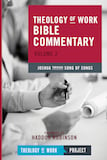Introduction to the Book of Ruth
Bible Commentary / Produced by TOW Project
The book of Ruth tells the extraordinary story of God’s faithfulness to Israel in the life and work of three ordinary people, Naomi, Ruth and Boaz. As they work through both economic hardship and prosperity, we see the hand of God at work most clearly in their productive agricultural labor, generous management of resources for the good of all, respectful treatment of co-workers, ingenuity in the face of necessity, and the conception and raising of children. Throughout everything God’s faithfulness to them creates opportunities for fruitful work, and their faithfulness to God brings the blessing of provision and security to each other and the people around them.
The events in the book of Ruth take place at the time of the festival of the barley harvest (Ruth 1:22; 2:17, 23; 3:2, 15, 17), when the connection between God’s blessing and human labor was celebrated. Two passages from the Torah give the background of the festival (emphasis added):
You shall observe the festival of harvest, of the first fruits of your labor, of what you sow in the field. (Exodus 23:16)
You shall keep the festival of weeks for the Lord your God, contributing a freewill offering in proportion to the blessing that you have received from the Lord your God. Rejoice before the Lord your God—you and your sons and your daughters, your male and female slaves, the Levites resident in your towns, as well as the strangers, the orphans, and the widows who are among you—at the place that the Lord your God will choose as a dwelling for his name. Remember that you were a slave in Egypt, and diligently observe these statutes. (Deuteronomy 16:10–12.)
Together these passages establish a theological foundation for the events in the Book of Ruth.
- God’s blessing is the source of human productivity (“blessing that you have received from the Lord”).
- God bestows his blessing of productivity through human labor (“fruits of your labor”).
- God calls people to provide opportunities to work productively (“remember that you were a slave in Egypt,” an allusion to God’s liberation of his people from slavery in Egypt and his provision for them in the wilderness and the land of Canaan) for poor and vulnerable people (“the strangers, the orphans and the widows.”)
In sum, productivity of human labor is an extension of God’s work in the world, and God’s blessing on human labor is inextricably linked to God’s command to provide generously for those without the means to provide for themselves. These principles underlie the Book of Ruth. But the book is a narrative, not a theological treatise, and the story is compelling.







